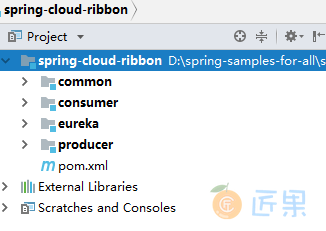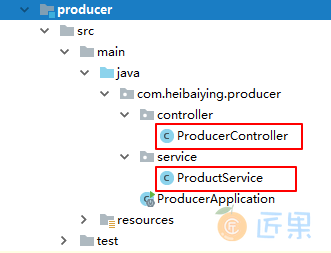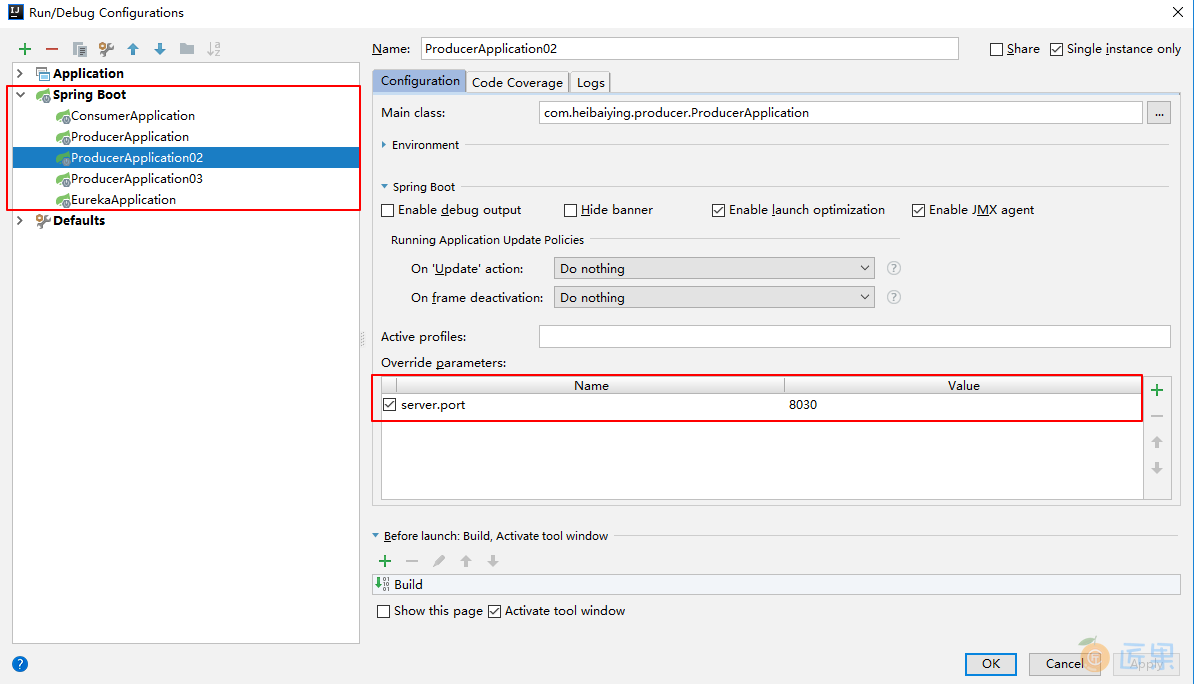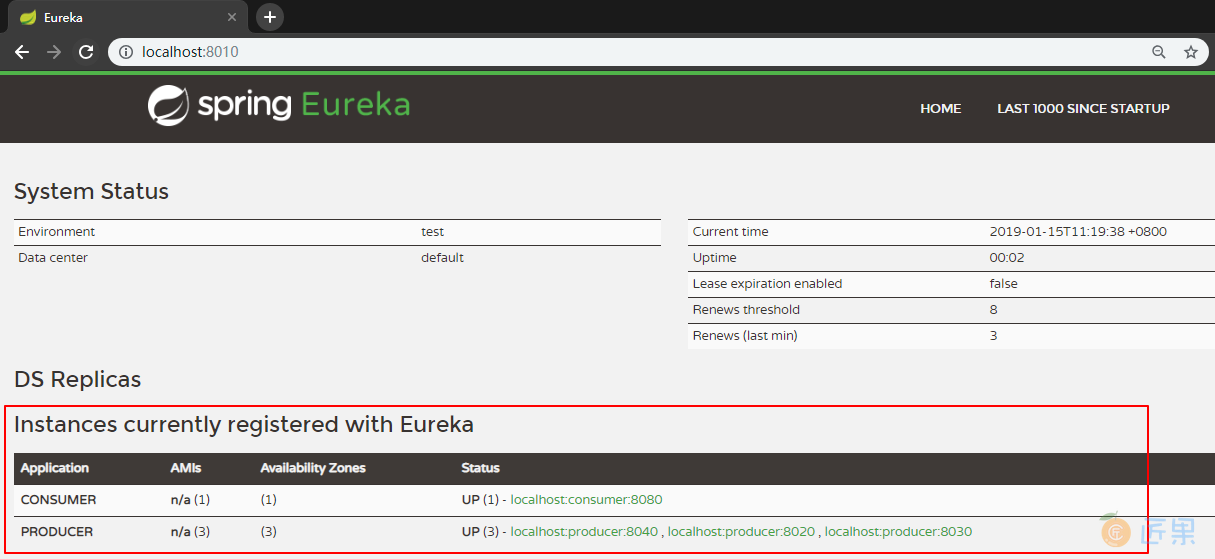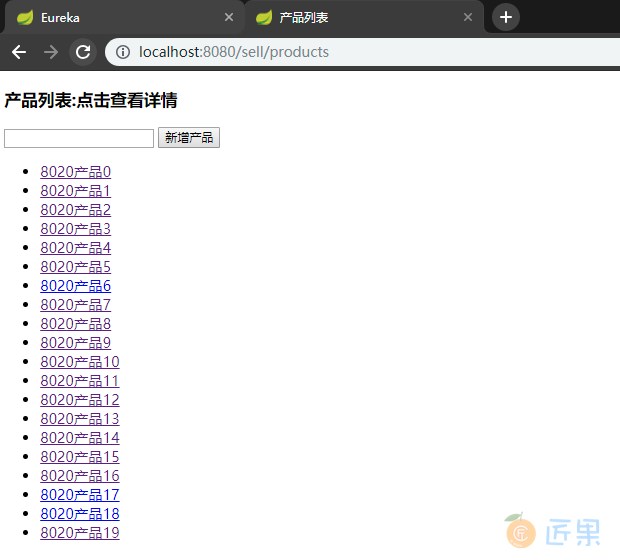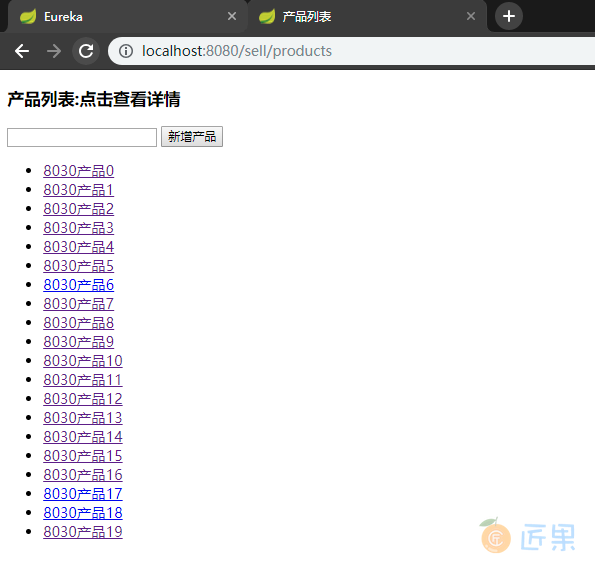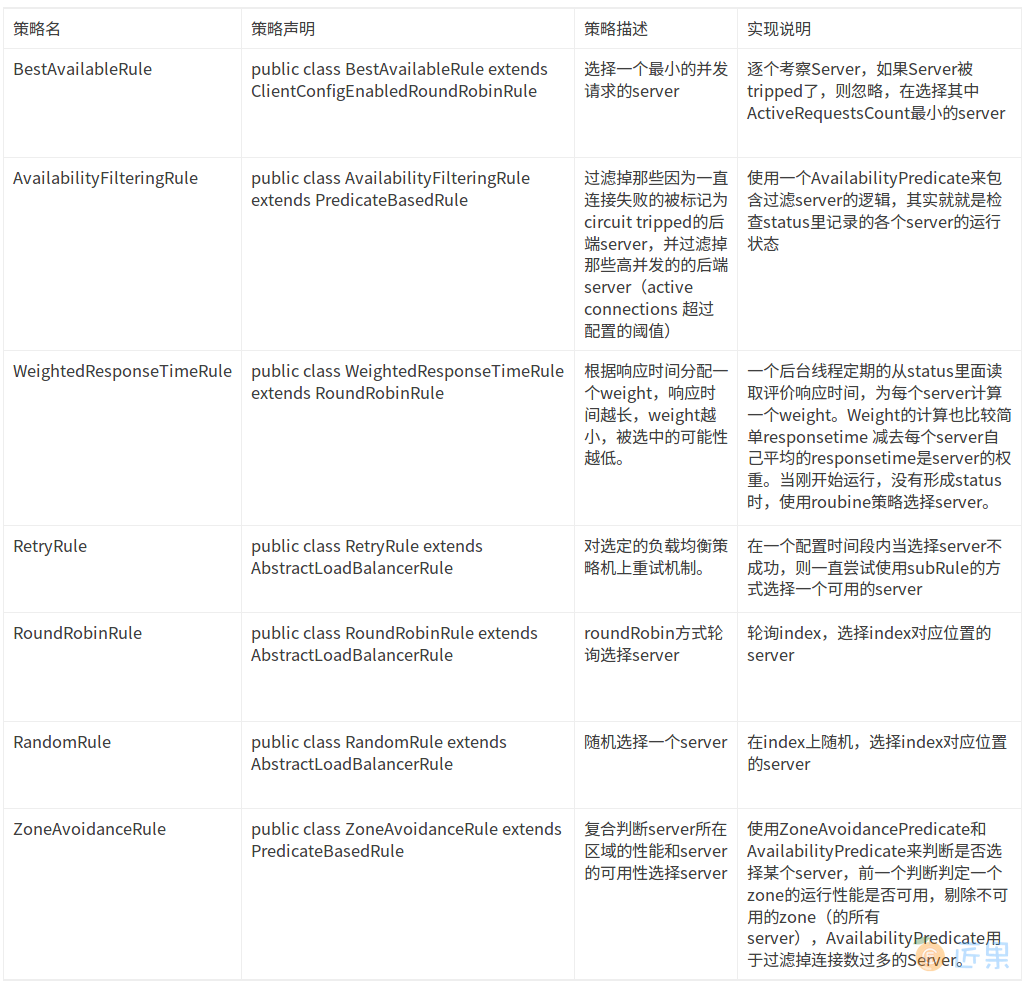一、Ribbon 简介
Ribbon 是 Netfix 公司开源的负载均衡组件,采用服务端负载均衡的方式,即消费者客户端维护可用的服务列表,并通过负载均衡的方式将请求按照指定的策略分摊给消费者,从而达到负载均衡的方式。
二、项目结构
- common :公共的接口和实体类;
- consumer :服务的消费者,采用 RestTemplate 调用产品服务;
- producer :服务的提供者;
- eureka :注册中心,Ribbon 从注册中心获取可用的服务列表,是实现负载均衡的基础。这里使用我们在 Eureka 服务的注册与发现 这个用例中搭建的注册中心即可。
三、服务提供者的实现
3.1 定义服务
产品服务由 ProductService 提供,并通过 ProducerController 将服务暴露给外部调用:
ProductService.java:
/**
* @author : heibaiying
* @description : 产品提供接口实现类
* 这里为了之后直观的看到负载均衡的结果,我们继承了 ApplicationListener,从 WebServerInitializedEvent 获取服务的端口号,并拼接在产品名称上
*/
@Service
public class ProductService implements IProductService, ApplicationListener<WebServerInitializedEvent> {
private static List<Product> productList = new ArrayList<>();
public Product queryProductById(int id) {
for (Product product : productList) {
if (product.getId() == id) {
return product;
}
}
return null;
}
public List<Product> queryAllProducts() {
return productList;
}
@Override
public void saveProduct(Product product) {
productList.add(product);
}
@Override
public void onApplicationEvent(WebServerInitializedEvent event) {
int port = event.getWebServer().getPort();
for (long i = 0; i < 20; i++) {
productList.add(new Product(i, port + "产品" + i, i / 2 == 0, new Date(), 66.66f * i));
}
}
}
ProducerController.java:
@RestController
public class ProducerController {
@Autowired
private IProductService productService;
@GetMapping("products")
public List<Product> productList() {
return productService.queryAllProducts();
}
@GetMapping("product/{id}")
public Product productDetail(@PathVariable int id) {
return productService.queryProductById(id);
}
@PostMapping("product")
public void save(@RequestBody Product product) {
productService.saveProduct(product);
}
}
3.2 注册服务
指定注册中心地址,并在启动类上开启自动注册 @EnableDiscoveryClient :
server:
port: 8020
# 指定服务命名
spring:
application:
name: producer
# 指定注册中心地址
eureka:
client:
serviceUrl:
defaultZone: http://localhost:8010/eureka/
@SpringBootApplication
@EnableDiscoveryClient
public class ProducerApplication {
public static void main(String[] args) {
SpringApplication.run(ProducerApplication.class, args);
}
}
四、服务消费者的实现
4.1 基本依赖
<!--ribbon 依赖-->
<dependency>
<groupId>org.springframework.cloud</groupId>
<artifactId>spring-cloud-starter-netflix-ribbon</artifactId>
</dependency>
4.2 注册服务
指定注册中心地址,并在启动类上开启自动注册@EnableDiscoveryClient:
server:
port: 8080
# 指定服务命名
spring:
application:
name: consumer
# 指定注册中心地址
eureka:
client:
serviceUrl:
defaultZone: http://localhost:8010/eureka/
@SpringBootApplication
@EnableDiscoveryClient
public class ConsumerApplication {
public static void main(String[] args) {
SpringApplication.run(ConsumerApplication.class, args);
}
}
4.3 @LoadBalanced
使用 @LoadBalanced 配置 RestTemplate 即可实现客户端负载均衡:
import org.springframework.cloud.client.loadbalancer.LoadBalanced;
import org.springframework.context.annotation.Bean;
import org.springframework.context.annotation.Configuration;
import org.springframework.web.client.RestTemplate;
@Configuration
public class RibbonConfig {
@LoadBalanced // 配置客户端负载均衡
@Bean
public RestTemplate restTemplate() {
return new RestTemplate();
}
}
4.4 调用远程服务
使用 RestTemplate 调用远程服务,这里我们在调用远程服务的时候,url 填写的是 服务名 + 具体接口地址 ,由于我们的同一个服务会存在多个实例,在使用@LoadBalanced 配置 RestTemplate 调用服务时,客户端就会从按照指定的负载均衡的方式将请求分摊到多个实例上。(默认的负载均衡采用的是 RoundRobinRule(轮询)的策略,有特殊需求时候可以采用其他内置的策略规则,或者实现 IRule 来定义自己的负载均衡策略)。
@Service
public class ProductService implements IProductService {
@Autowired
private RestTemplate restTemplate;
public Product queryProductById(int id) {
ResponseEntity<Product> responseEntity = restTemplate.getForEntity("http://producer/product/{1}", Product.class, id);
return responseEntity.getBody();
}
public List<Product> queryAllProducts() {
ResponseEntity<List> responseEntity = restTemplate.getForEntity("http://producer/products", List.class);
List<Product> productList = responseEntity.getBody();
return productList;
}
public void saveProduct(Product product) {
restTemplate.postForObject("http://producer/product", product, Void.class);
}
}
五、启动测试
5.1 启动服务
启动一个Eureka服务、三个生产者服务(注意区分端口)、和一个消费者服务:
服务注册中心:
5.2 验证负载均衡
访问 http://localhost:8080/sell/products 查看负载均衡的调用结果:
六、RestTemplate
6.1 RestTemplate 规范
在使用 RestTemplate 调用对应 RESTFul 接口时候,使用的方法应该与接口声明方式(@GetMapping、@PostMapping、@PutMapping、@DeleteMapping)保持一致。其对应关系如下:
- GET 请求 ( getForObject 、getForEntity )
- POST 请求( postForObject 、postForEntity)
- PUT 请求( put )
- DELETE 请求 ( delete )
6.2 ForEntity 和 ForObject 的区别
ForEntity()发送一个请求,返回的 ResponseEntity 包含了响应体所映射成的对象,ForObject()发送一个请求,返回的请求体将映射为一个对象。示例如下:ResponseEntity<Product> responseEntity = restTemplate.getForEntity("http://producer/product/{1}", Product.class, id); Product product = restTemplate.getForObject("http://producer/product/{1}", Product.class, id);
七、负载均衡策略
Ribbon 内置了多种负载均衡策略,如果有更复杂的需求,可以自己实现 IRule。
7.1 内置的负载均衡的策略
图片来源于博客:Ribbon 负载均衡策略与自定义配置
7.2 指定负载均衡的策略
可以通过两种方式来为服务指定具体的负载均衡的策略,分别是基于配置的方式和基于代码的方式:
1. 基于配置的方式
如下将为名为 user 的服务设置其负载均衡的策略为 WeightedResponseTimeRule :
users:
ribbon:
NFLoadBalancerRuleClassName: com.netflix.loadbalancer.WeightedResponseTimeRule
2. 基于代码的方式
@Configuration
@RibbonClient(name = "custom", configuration = CustomConfiguration.class)
public class TestConfiguration {
}
@Configuration
public class CustomConfiguration {
@Bean
public IRule ribbonRule() {
return new BestAvailableRule();
}
}
在使用代码方式时, 官方文档 中有以下强调说明:
The CustomConfiguration clas must be a @Configuration class, but take care that it is not in a @ComponentScan
for the main application context. Otherwise, it is shared by all the @RibbonClients. If you use @ComponentScan
(or @SpringBootApplication), you need to take steps to avoid it being included (for instance, you can put it
in a separate, non-overlapping package or specify the packages to scan explicitly in the @ComponentScan).
CustomConfiguration 类必须使用 @Configuration 进行注解,但需要注意的它不能在 @ComponentScan 主应用程序的上下文。否则,它将被所有 @RibbonClients 共享。如果你使用 @ComponentScan(或 @SpringBootApplication),你需要采取一些措施来避免它被扫描到(例如,你可以把它放在一个独立的,非重叠的包,或用 @ComponentScan 时显示扫描指定的包,从而避开扫描到 CustomConfiguration 所在的包)。
